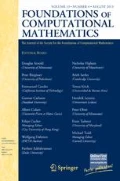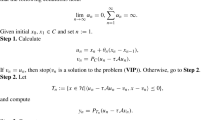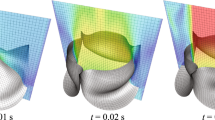Abstract
We study the worst case complexity and the tractability of the model second-order problem \(-\Delta u+u=f\) on \(I^d=(0,1)^d \) with homogeneous Neumann boundary conditions. As is often the case, we study the variational formulation of this problem. Previous work on the tractability of problems such as this relied on the fact that such problems were reducible to the \(L_2(I^d)\)-approximation problem, which allowed us to find necessary and sufficient conditions for the problem to have a given degree of tractability. However, such an approach can only yield sufficient conditions, and not necessary conditions, for the model second-order Neumann problem to have a given degree of tractability. In this paper, we remedy this gap and find necessary and sufficient conditions for this Neumann problem to exhibit a given degree of tractability.
Similar content being viewed by others
Notes
The definitions in this section would also work when \(H_d\) is a normed space rather than a Hilbert space, but since the specific space \(H_d\) we use is a Hilbert space, there is no need to introduce this extra generality.
Note that the information \(N\) is nonadaptive. There is no need to consider adaptive information in this paper since our problem is linear, and it is well known that adaption does not help much for linear problems.
References
R. A. Adams and J. J. F. Fournier. Sobolev spaces, volume 140 of Pure and Applied Mathematics (Amsterdam). Elsevier/Academic Press, Amsterdam, second edition, 2003.
R. E. Bellman. Dynamic Programming. Princeton University Press, Princeton, NJ, 1957.
M. Gnewuch and H. Woźniakowski. Quasi-polynomial tractability. J. Complexity, 27(3–4):312–330, 2011.
E. Novak and H. Woźniakowski. Tractability of Multivariate Problems. Vol. I: Linear Information, volume 6 of EMS Tracts in Mathematics. European Mathematical Society (EMS), Zürich, 2008.
E. Novak and H. Woźniakowski. Tractability of Multivariate Problems. Vol. II: Standard Information for Functionals, volume 12 of EMS Tracts in Mathematics European Mathematical Society (EMS), Zürich, 2010.
E. Novak and H. Woźniakowski. Tractability of Multivariate Problems. Vol. III: Standard Information for Operators, volume 18 of EMS Tracts in Mathematics. European Mathematical Society (EMS), Zürich, 2012.
C. Thomas-Agnan. Computing a family of reproducing kernels for statistical applications. Numerical Algorithms, 13:21–32, 1996.
J. F. Traub, G. W. Wasilkowski, and H. Woźniakowski. Information-Based Complexity. Academic Press, New York, 1988.
J. F. Traub and A. G. Werschulz. Complexity and information. Lezioni Lincee. [Lincei Lectures]. Cambridge University Press, Cambridge, 1998.
H. Triebel. Function spaces in Lipschitz domains and on Lipschitz manifolds. Characteristic functions as pointwise multipliers. Rev. Mat. Complut., 15(2):475–524, 2002.
A. G. Werschulz. The computational complexity of differential and integral equations. Oxford Mathematical Monographs. The Clarendon Press Oxford University Press, New York, 1991. An information-based approach, Oxford Science Publications.
A. G. Werschulz and H. Woźniakowski. Tractability of quasilinear problems. II. Second-order elliptic problems. Math. Comp., 76(258):745–776, 2007.
A. G. Werschulz and H. Woźniakowski. Tractability of multivariate approximation over a weighted unanchored Sobolev space. Constr. Approx., 30(3):395–421, 2009.
Acknowledgments
We are grateful to the referees for their helpful suggestions, especially the connection of our problem to the approximation problem in the Besov and Triebel–Lizorkin norms. This research was supported in part by the National Science Foundation.
Author information
Authors and Affiliations
Corresponding author
Additional information
Communicated by Phillipe G. Ciarlet.
Rights and permissions
About this article
Cite this article
Werschulz, A.G., Woźniakowski, H. Tight Tractability Results for a Model Second-Order Neumann Problem. Found Comput Math 15, 899–929 (2015). https://doi.org/10.1007/s10208-014-9195-y
Received:
Revised:
Accepted:
Published:
Issue Date:
DOI: https://doi.org/10.1007/s10208-014-9195-y
Keywords
- Second-order Neumann problem
- Information-based complexity
- Tractability
- Problems over high-dimensional domains




